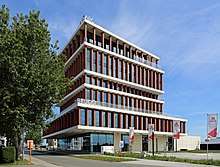Zeebrugge
Zeebrugge (Dutch pronunciation: [zeːˈbrʏɣə], from: Brugge aan zee[1] [ˌbrʏɣə ʔaːn ˈzeː] meaning "Bruges at Sea",[2] French: Zeebruges) is a village on the coast of Belgium and a subdivision of Bruges, for which it is the modern port. Zeebrugge serves as both the international port of Bruges-Zeebrugge and a seafront resort with hotels, cafés, a marina and a beach.

Location
Zeebrugge is located on the coast of the North Sea. Its central location on the Belgian coast, short distance to Great Britain and close vicinity to densely populated industrialised cities make it a crossroads for traffic from all directions. An expressway to Bruges connects Zeebrugge to the European motorway system; one can also get to and from Zeebrugge by train or tram. A 12 km canal links the port to the centre of Bruges.
It is Belgium's most important fishing port[3][4] and the wholesale fish market located there is one of the largest in Europe.
Aside from being a passenger terminal with ferries to the United Kingdom, the harbour serves as the central port for Europe's automotive industry, and it is important for the import, handling and storage of energy products, agriculture products and other general cargo. Zeebrugge has the largest LNG terminal complex in Europe.[5]
History
The harbour was the site of the Zeebrugge Raid on 23 April 1918, when the British Royal Navy temporarily put the German inland naval base at Bruges out of action.[6] Admiral Roger Keyes planned and led the raid that stormed the German batteries and sank three old warships at the entrance to the canal leading to the inland port. This action was a partial success as it blocked the access, but the Germans dug a new canal around the ships. The raid, although a morale-boosting victory in Britain, was also claimed as a victory in Germany.
Later, in 1987, Zeebrugge's harbour was the scene of disaster when the MS Herald of Free Enterprise passenger ferry capsized, killing 193 people.[7]
Passenger ferry routes
See also
- Port of Bruges-Zeebrugge
- West Flanders
- Zeebrugge Hub
References
- Degraer, Hugo (1968). Repertorium van de pers in West-Vlaanderen 1807–1914. Nauwelaerts, University of Michigan. p. 143., Snippet pages 143
- Boniface, Brian G.; Cooper, Christopher P. (2001). Worldwide destinations: the geography of travel and tourism (3 ed.). Butterworth-Heinemann. p. 140. ISBN 0-7506-4231-9., page 140
- Wickman, Stephen B. (1986), Belgium, a country study, Volume 1984, Headquarters, Dept. of the Army, p. 199
- World fishing, Volume 40. IPC Industrial Press. 1991. p. 15.
- Derdak, Thomas; Grant, Tina (2006). International Directory of Company Histories, Volume 82. St. James Press. p. 92. ISBN 1-55862-586-0.
- Warner, Philip (1978), The Zeebrugge raid, W. Kimber, ISBN 0-7183-0056-4
- Whittingham, R.B. (2008). Preventing corporate accidents: an ethical approach. Butterworth-Heinemann. p. 290. ISBN 0-7506-8062-8., Appendix 1, p 290
External links
| Wikimedia Commons has media related to Zeebrugge. |
- Brugge.be
- Kitelinks.be, live weather in zeebrugge